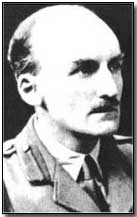Who's Who - John Fuller
 John Frederick Charles Fuller
(1878-1966) played a key role in the implementation of British tank
strategy during World War One.
John Frederick Charles Fuller
(1878-1966) played a key role in the implementation of British tank
strategy during World War One.
Following an education at Sandhurst Fuller was commissioned into the British Army in 1898. Almost immediately he saw active service during the 1899-1902 South African War.
From 1903-06 he served in India, and in 1911 was promoted to Captain, two years before he entered the Staff College at Camberley at the second attempt.
Fuller was possessed of a restless, innovative mind. He was constantly devising new and better ways of applying the principles of mechanised warfare to the battlefield. While this was of undoubted benefit to his country it also unfortunately led to innumerable conflicts with the somewhat rigid army methodology of the era.
When the First World War broke out Fuller found himself posted as a staff officer on account of his training at Camberley. In 1915 he was responsible for organising training programmes for senior officers.
Fuller's career breakthrough came however in December 1916 with his appointment as Chief of Staff to what in time became the Tank Corps. Fuller quickly became convinced that the tank possessed the potential to bring an end to the stalemate of trench warfare and turned over many schemes by which this could be achieved.
In time Fuller actively sponsored and devised the massed tank attack which characterised the Battle of Cambrai (put into operation by Julian Byng on 20 November 1917). The spectacular initial success at Cambrai (when the advancing tanks succeeded in piercing the hitherto impregnable Hindenburg Line) led to increased tank offensives during 1918, which Fuller helped to plan. With partial success at Cambrai Fuller had played a large role in successfully resurrecting the tank's waning reputation as a potent offensive field weapon.
Ambitious as ever Fuller subsequently devised "Plan 1919" which called for a massed co-ordinated attack in depth consisting of tanks and aircraft to win the war outright - a predecessor of the German Army's Second World War blitzkrieg operations and resolutely ignored at home in Britain.
Following the armistice Fuller taught at Camberley and served as assistant to the Chief of the Imperial General Staff in 1926. However the very vigour with which Fuller urged ongoing army reform - often spilling over into near insubordination: Fuller was a most irascible man - ultimately brought his army career to an early close. Following command of the Experimental Force (Tank) brigade in 1926 he was promoted to Major-General in 1930, placed on half pay, and retired.
Fuller subsequently took up a career in journalism and as a historian, becoming military correspondent for the Daily Mail. During the 1930s he espoused the fascist cause. Fuller's principles of mechanised warfare were to prove highly influential during the 1930s and of direct relevance during the Second World War.
He died in 1966.
3 British Officers were executed by courts martial during the war, as opposed to 316 Private soldiers and 24 Non-Commissioned Officers. The vast majority were for desertions.
- Did you know?
